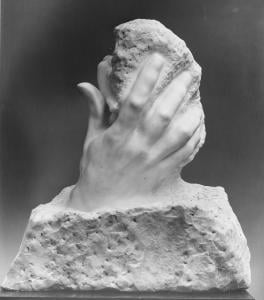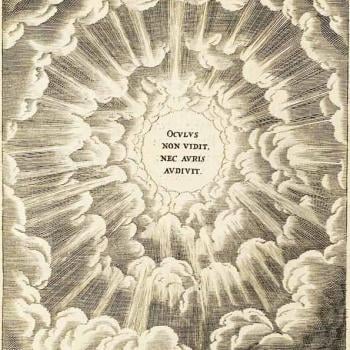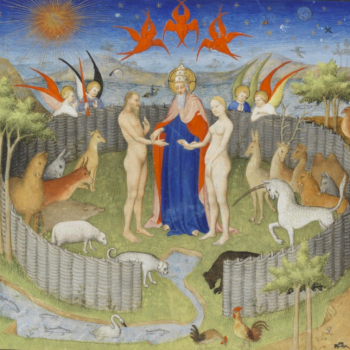
One ancient heresy which was common among those who read Scripture very simply, very literally, and sometimes finds itself manifest to this day, is the belief that God has a material body, and with that body, looks like us, or rather, we, in our bodies, resemble God’s physical form. Those who hold this belief say this is what it means to be made in God’s image and likeness. We were made to resemble God, having a body like God’s body, so when Scripture talks about bodily parts, such as a head, hands, fingers, a heart, and feet, all of them are to be taken literally. This kind of reading shows someone who does not understand poetic diction, and with it the symbols and analogies being presented when it is used. Christianity (and Judaism before) recognizes God does not have a physical body, but rather, is a spirit.
One way to challenge this reading, beyond Christian tradition, and those verses which talk about God being a spirit, is to point out nowhere does Scripture say only humanity is made in God’s image and likeness. Rather, it is possible to say all things, in their own way, are made to conform to God’s image and likeness, to be logoi of the Logos, so that everything, in their own way, reflects the divine, including those who do not posses such bodily parts.
Of course, we can and should apprehend the divine nature by examining ourselves, trying to discern what in us can serve as an analogy to reflect a quality of the divine nature. This is why, Scripture can use various human features, like hands, to represent God, but we must understand it does so to have us consider how those features represent something within the divine nature itself. Didymus the Blind, and many others, when talking about what Scripture means when talking about God’s hands says they represent powers God uses to act upon creation; in that manner, Didymus said we can talk about God as having more than two hands:
And it is also possible to say that there are not only two hands of God, for it was not said in the dual form but in the plural. Plural or dual do not differ in form. Nevertheless, if they are the two covenants, the hands are mentioned in dual form. However, if the powers of God is called his hand – for we call the military might of a king his hand – into your military might, which is your guardian hand, I entrust my spirit. [1]
As we are called to join ourselves with God work in and with the world, we join ourselves with those powers, and in doing so, can be said to become God’s hands (and feet) in the world. That is, we are to find a way to creatively engage God’s work in the world, to become, as it were, God’s instruments, not in the sense of being God’s puppets, but in the sense of being given the grace necessary to work in the world for the sake of its positive transformation. Thus, as the Russian theologian Sergius Bulgakov pointed out, God’s providence works in and through us and with us, giving us the freedom we need to do so in a way which confirms our own subjectivity:
As the subject of Divine Providence, the world is not only a thing or an object in the hands of God – it has its own distinctive existence, given to it by God at Creation, its own distinctive nature, its own distinctive life. And at the same time its created nature does not remain outside God, because there is no such thing ontologically as extra-divine existence. The world abides in God, although it is not God, and God’s relationship to the world in Divine Providence is defined not as the unilateral action of God on a world lying outside of Him and foreign to Him, but as the synergy of the Creator with creation. For this, both parties to the synergy must, first of all, possess their own reality and independence, but also mutual connectedness and dependence, yet these are completely absent in all shades of predestination. [2]
J.R.R Tolkien, recognizing the validity of this line of thought, nonetheless feared that we can do so with pride. He wanted to confirm the way God worked in and with him in his work, but he also wanted to make sure he kept humble while doing so:
God grant that this does not sound arrogant – I feel humbler enough in truth and immeasurably weaker and poorer now. The greatness I meant was that of a great instrument in God’s hands – a mover, a doer, even an achiever of great things, a beginner at the very least of large things.[3]
We should be like Tolkien, embracing humility, for it is in and with such humility we can transcend ourselves, transcend our own fallen, false sense of self, which is what we need to do to be truly free subjects who can then continue God’s work in time. We are to engage what we have, to even be creative (or sub-creative) as we do so, but again, doing so as long as we do so in cooperation with (or in synergy with) God’s will. Tolkien felt he had a special task to do, one which he did in his own fashion; he knew he had to do it, it was a part of who and what he was, but he also knew it was still connected with God’s providence and the way God works in and through all of us, so that any greatness he accomplished was his, but his in a way which would not have been possible if he did not have God’s grace elevating and making it the best it can be.
God has no hands and many hands; God has no face and a face which we can engage; God has no feet, and yet is said to walk amongst us. We must always recognize the way we imagine God is not literal, that we look to and try to understand God through analogies and symbols; if we do not keep this in mind, it will be easy for us to fall for all kinds of errors as we take that which is not literal as literal, replacing the invisible, incomprehensible, transcendent God with an idol, one which takes up and presents qualities which often are made from our own image. This is an error which has been made many times throughout history, and because it has, many have been led to think all discussion of who and what God is represents humanity trying to deify itself, to make God in its own image. Those who would deny such a God are right, because such a God is not God; but they are wrong in saying that is the only way God can be and is understood. Apophatic theology takes that insight and transcends it, showing how we can then come to experience the truth of God and express it, and this is exactly the insight which we must embrace if we are to read Scripture and its descriptions of God correctly.
[1] Didymus the Blind, Lectures on the Psalms. Trans. Jonathan Douglas Hicks (Downers Grove, IL: InterVarsity Press, 2024), 144.
[2] Sergius Bulgakov, Judas Iscariot – Apostle – Betrayer. Trans. Mike Whitton (No City Listed: Independently Published, 2023), 60.
[3] J.R.R. Tolkien, The Letters of J.R.R. Tolkien. Revised and Expanded Edition. Ed. Humphrey Carpenter and Christopher Tolkien (Broadway, NY: William Morrow, 2023), 6 [Letter 5 to G. H. Smith].
Stay in touch! Like A Little Bit of Nothing on Facebook.
If you liked what you read, please consider sharing it with your friends and family!
N.B.: While I read comments to moderate them, I rarely respond to them. If I don’t respond to your comment directly, don’t assume I am unthankful for it. I appreciate it. But I want readers to feel free to ask questions, and hopefully, dialogue with each other. I have shared what I wanted to say, though some responses will get a brief reply by me, or, if I find it interesting and something I can engage fully, as the foundation for another post. I have had many posts inspired or improved upon thanks to my readers.















